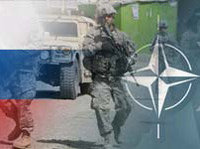Russia-NATO summit: Catching wind in the net
 Russia-NATO summit opened in the capital of Portugal, Lisbon. Russia's relations with the alliance have been improving lately. The dialogue between Russia and NATO was paused after the war in South Ossetia, but the previous format of relations was subsequently retrieved.
Russia-NATO summit opened in the capital of Portugal, Lisbon. Russia's relations with the alliance have been improving lately. The dialogue between Russia and NATO was paused after the war in South Ossetia, but the previous format of relations was subsequently retrieved.

Old problems have not gone anywhere. NATO officials stated prior to the meeting in Lisbon that there was no need in signing the new European Security Treaty, which Russia tries to promote. NATO also offers cooperation in the field of missile defense. It is not ruled out that the alliance is trying to trick Russia to be able to deploy elements of missile defense system in Bulgaria and Romania.
There is another problem too. Russia wants NATO to refuse from the deployment of nuclear arms in Eastern Europe. Rasmussen denies its presence there. However, the Baltic States claim that such statements from Moscow testify to Russia's intention to retrieve the lost influence in the region. Therefore, no one can guarantee that American nuclear arms will not appear near Russia's borders already in the near future.
In addition to nuclear arms there is also a problem related to conventional weapons. Lithuania, Latvia and Estonia are not members of the Conventional Forces in Europe Treaty (the document, signed 20 years ago to restrict conventional arms in Europe). If so, these countries can be used as a base for concentrating NATO attack forces near Russia's borders.
For Rasmussen, this problem does not exist. He did not say a word about an opportunity for the Baltic States to join CFE Treaty. Lithuania, Latvia and Estonia did not express such a wish either. Such problems exist with Albania, Slovenia and Croatia too.
Russia ratified CFE, whereas NATO did not. NATO official claim that Russia must withdraw its troops from Georgia and Moldova. There are no Russian troops in Georgia. South Ossetia and Abkhazia are not Georgian territories. As for Moldova, Russia has UN-mandated peacemakers in the Transdniestr region, but there are no Russian bases there.
As a result, Russia suspended the execution of its obligations on the treaty at the end of 2007. However, Russia's decision did not make NATO ratify the treaty anyway.
Dmitry Rogozin, Russia's Ambassador to NATO, said: "Moscow is not going to give answers to many questions that interest Rasmussen. But we will have to analyze everything meticulously when making decisions. It touches upon such issues as the joint missile defense system and the withdrawal of troops from Transdniestria. Russia is ready to cooperate with NATO on Afghanistan, particularly in the struggle against the trafficking of drugs. But the administration of the alliance should know that Russia will never deploy its troops in Afghanistan. It is excluded completely," the official said.
Alexander Rahr, a German scientist of politics:
"Apparently, the summit in Lisbon will be just a meeting to maintain the dialogue between Russia and NATO. Everyone will declare their friendly intentions, but nothing is going to change. I do not think that we will see any serious progress. Even NATO members do not know what the Americans intend to offer. Washington promotes its missile defense system claiming that it can be a solution to some unclear problems, which they can not formulate clearly themselves," the expert said.
Sergey Balmasov
Pravda.Ru
Subscribe to Pravda.Ru Telegram channel, Facebook, RSS!

